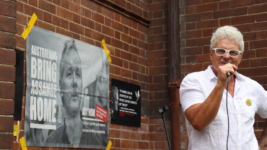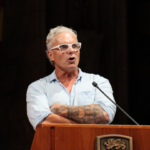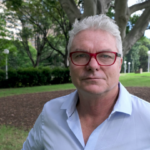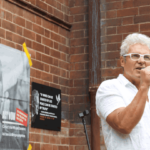Truthteller’s Criminal Trial Will Proceed, Despite His Actions Being in the Public Interest

David McBride has become a national figure for truth at a time when the concept of a moral truth –a right or a wrong, justice or the convenient twisting of the fact – has been so spun by the secretive, privileged and disconnected political class in Canberra that the ground is falling out beneath it.
In his own words, McBride, for most of his life, was a “true believer” in the cause of western allies. He studied at Oxford University and attended Sandhurst Military College. He’d served as a major in the British army, prior to becoming an Australian Defence Force lawyer, serving twice in Afghanistan.
And during his two deployments over 2011 and 2013, McBride began to realise that something was a bit off, as Australian special forces operations appeared to be governed by how their outcome would reflect on those in Canberra, rather than any practicalities on the ground.
But it wasn’t just McBride who was privy to this. In 2016, due to rumours of Australian war crimes in Afghanistan, the Chief of the Army referred the matter to the Inspector General of the ADF, who launched the Brereton inquiry, which, in 2020, referred 36 matters to the AFP for investigation.
McBride, however, is about to face a criminal trial on 13 November in Canberra for having blown the whistle in regard to the similar problematic ADF operations, which resulted in the ABC’s 2017 report The Afghan Files, as well as a broader public understanding of a problem already loose at the seams.
Nothing to be gained
Under a Coalition government newly headed by Scott Morrison, the prosecution against McBride commenced in September 2018, with the nod of approval coming from then Australian attorney general Christian Porter.
The initial charging of the lawyer came just three months after the prosecutions against Timor-Leste co-whistleblowers ex-ASIS officer Witness K and barrister Bernard Collaery were launched under Turnbull and Porter, which had been a case left lying dormant since 2013.
Further charges were laid against McBride in March 2019 – he’s facing five national security offences that could see him sent away for life – which was the same month, former Australian Taxation Office employee Richard Boyle was charged with 66 offences for outing illegal practices at the agency.
So, with all these high-profile whistling blowing cases emerging within a short period and under the same AG, the Liberal Nationals were making it clear to the entire public service: either stay mum about any backdoor inconsistencies or be fried in front of the public whose interest you’re acting in.
Indeed, the rolling out of the Witness K case five years after ASIO had raided both men’s premises and then AG George Brandis had let the case drop, was a clear message that half a decade into the Coalition’s governance, it felt emboldened to settle old scores and damn the public interest.
Everything to be stained
McBride was charged under a Liberal Nationals government that was being run by Morrison, who secretly had the attorney general swear him in to five extra ministries, and whilst current opposition leader Peter Dutton was the head of the newly created then super-ministry of Home Affairs.
So, whilst Porter was ticking off names on the whistleblowing hitlist, Dutton was consumed with national security, especially with gifting international spies with the ability to monitor the public, with since disgraced then Home Affairs secretary Mike Pezzullo in his ear, as his right-hand-man.
And this wanton punishment of upstanding community members, who’ve spoken out of line for the good of the public, whilst the government concurrently swept up the messes they’d exposed, was the method the Coalition was abusing to stop these corruption blemishes coming to light.
But on 21 May last year, all this was meant to come to an end, as the Coalition was voted out of its decade in office and federal Labor took the reins, with Anthony Albanese as PM and Mark Dreyfus as the new Australian chief lawmaker.
For the whistleblowers still being prosecuted – McBride, Collaery and Boyle, as Witness K pleaded guilty in mid-2021 – this changing of the guard brought valid hope, as Dreyfus had passed the whistleblowing protections in 2013, during his last stint as AG, and he’d since admitted their failing.
As he oversaw the passing of legislation that made a first round of changes to his Public Interest Disclosure Act 2013 (Cth) in June, Dreyfus announced, “The Albanese government has delivered on our promise to the Australian people to strengthen protections for public sector whistleblowers.”
Yet, this led many whistleblower supporters, including the Alliance Against Political Prosecutions (AAPP), to scratch their heads in wonder, as the AG had done absolutely nothing to protect McBride and Boyle for their truth-telling, which was done under the provisions of the PID Act.
The attorney general had, however, dropped the prosecution against Collaery in July last year, as not only does Dreyfus have the power to redraft his own laws that provided no protections for anyone, but he can also decide to cancel a prosecution outright.
Section 71 of the Judiciary Act 1903 (Cth) permits the AG to discontinue a prosecution of an individual charged with “an indictable offence against the laws of the Commonwealth”.
Right after Collaery’s case was dropped, AAPP wrote to Dreyfus asking him why he’d put a halt to only one of the three whistleblowing cases that a paranoid Coalition cabinet had commenced, and he responded that he could only use his power under “very unusual and exceptional circumstances”.
And with such a lack of a clear explanation as to why only one case was dropped and not the other two, one is left to speculate that the difference was that Collaery, a noted barrister, was on the cusp of exposing six identified matters both major parties obviously want kept secret.
A loss of anything to believe in
Whilst McBride’s decision to tell the truth in the public interest was his own doing, the lawyer is also a product of the system of governance that he’s lived under, which, as he says so himself, he was a true believer in.
McBride’s honest belief that the truths he’d been raised on and the system had drummed into him as something to sincerely depend upon, was shattered in Afghanistan, during the war on terror, at a time when globally a chink in the armour of the western allies was becoming apparent.
And the truth is the Albanese government could still bring McBride’s trial to an end. Dreyfus could exercise his power to drop the prosecution, right now. And then perhaps the country, and David McBride, would have something to respect and place value in sitting in two chambers in Canberra.







